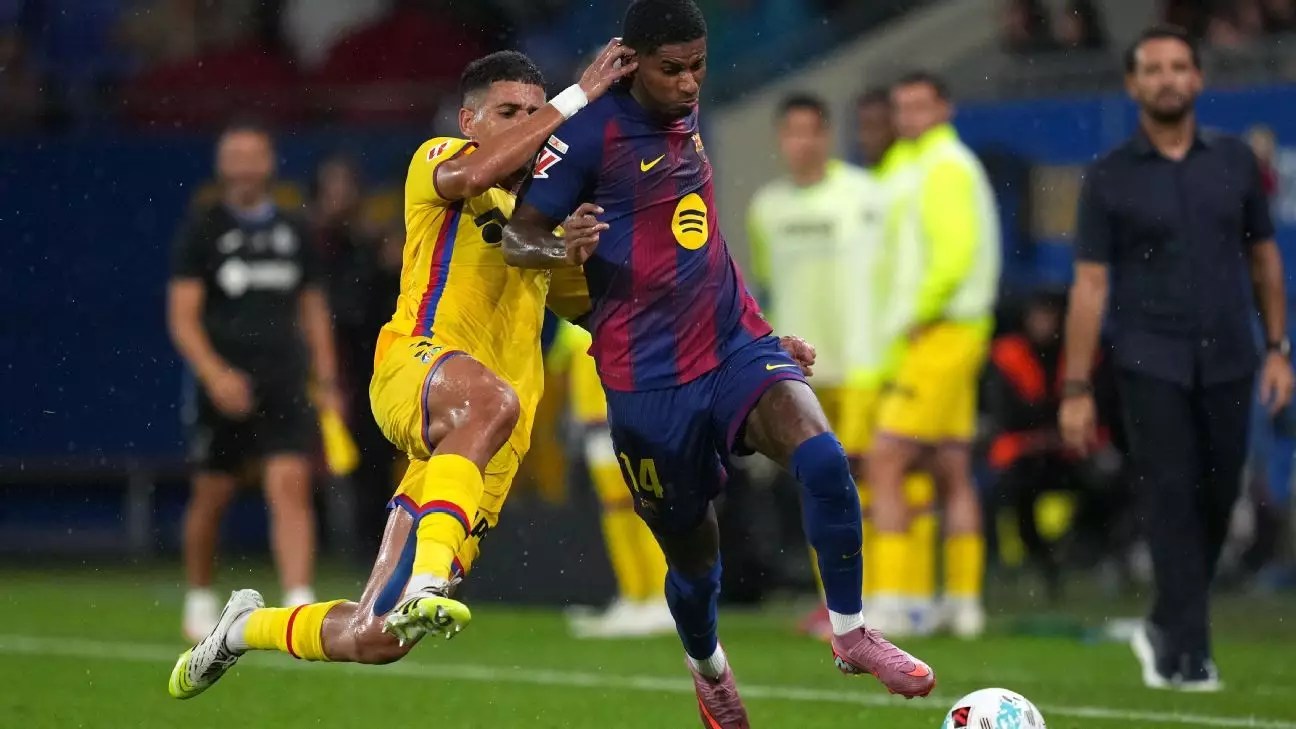In the high-stakes world of professional football, every decision made by a coach echoes beyond the tactical sphere—it reflects discipline, professionalism, and team cohesion. The recent decision by Hansi Flick to bench Marcus Rashford, despite his impressive performance against Newcastle United, highlights the complex interplay between individual brilliance and team discipline. Midweek heroics, such as Rashford’s brace in the Champions League, often elevate a player’s reputation. Yet, in football’s modern landscape, commitment to team protocols holds equal, if not greater, weight.
Rashford’s late arrival to the activation session—though described subtly as “marginally late”—becomes instrumental in understanding how minor breaches of discipline are scrutinized at this level. Coaches like Flick impose strict policies precisely because they recognize the fragility of team synergy. It’s a reminder that talent alone cannot guarantee a starting position; discipline, punctuality, and adherence to team norms are non-negotiable. This stance ensures that players internalize professionalism, understanding that individual brilliance must operate within a framework of collective responsibility.
What’s perhaps most intriguing is Flick’s nuanced approach—downplaying the lateness as “normal” in the context of frequent matches, yet maintaining a zero-tolerance policy. Such dichotomy showcases that while flexibility exists, boundaries are non-negotiable, underpinning a culture where consistency and accountability are prioritized over temporary form or reputation.
Strategic Flexibility: The Art of Rotation and Rest
The decision to withdraw Rashford after his impressive performance also underscores a core principle of modern coaching: strategic rotation. Faced with a congested fixture schedule, coaches must juggle fresh legs and player fatigue. Flick’s assertion that “we also need fresh legs on the pitch” speaks to a tactical truth—rest is as vital as skill, especially in demanding leagues like La Liga and Champions League. Maintaining peak physical condition is vital for sustaining performance, reducing injury risks, and injecting energy into the team.
Benching Rashford isn’t a critique of his talent; rather, it’s an investment in the long-term success of the squad. This pragmatic approach exemplifies how elite teams craft their strategies—not merely to win one game but to optimize squad health across a demanding season. The inclusion of Rashford later in the game, contributing decisively, illustrates the importance of moderation and calculated substitution—a lesson countless teams could learn from in the relentless pursuit of consistency.
Furthermore, the team’s cohesive performance, culminating in a convincing 3-0 victory, signifies that discipline and rotation do not compromise quality but rather enhance it. It’s a message that modern football demands not just individual star power, but the strategic orchestration of talent and effort—an art mastered by clubs with sustained success.
Culture of Discipline: A Double-Edged Sword?
The strict disciplinary policies, as exemplified by Flick’s handling of lateness and benching, reveal a broader philosophy—one that values structure and professionalism over comfort or favoritism. These policies, while perhaps harsh on individual players, foster a culture where accountability reigns. The case of Jules Koundé and Iñaki Peña, who have been previously disciplined, reinforces that consistency is key to cultivating a disciplined environment.
Yet, this approach also risks veering into rigidity, potentially stifling player morale or fostering resentment. Achieving balance in disciplinary measures is crucial: too lenient, and standards slip; too strict, and team spirit may suffer. The challenge for contemporary managers is to enforce discipline without eroding intrinsic motivation. Flick’s method appears to emphasize respect for the collective effort, a philosophy that emphasizes how accountability and standards ultimately serve the team’s collective success.
Additionally, external comments from rival coaches, such as Jose Bordalas’ criticism of Barcelona’s financial disparity, serve as reminders that discipline within a team extends beyond the pitch. It involves managing external pressures, expectations, and perceptions—elements that influence tactical decisions and team cohesion. In this dynamic, discipline becomes the bedrock of resilience against external scrutiny and internal uncertainty.
Balancing Talent with Intensity in Football’s Modern Era
The performances of players like Ferran Torres and the tactical dominance displayed in the 3-0 victory shed light on the importance of blending high-caliber talent with relentless intensity. Barcelona’s unbeaten streak this season shows that a well-coordinated, disciplined squad can outperform wealthier opponents. Managerial decisions, such as deploying specific tactical plans and enforcing disciplined gameplay, are pivotal in transforming raw talent into consistent success.
Moreover, the incidents involving players like Fermín López, who faces potential injury assessments, underscore how crucial player health and readiness are in shaping long-term strategies. Managing injuries, ensuring proper recovery, and keeping key players like Lamine Yamal in game shape form the backbone of sustained excellence. Teams that excel in these aspects tend to maintain a competitive edge and build momentum over the course of a season.
The crux of modern football is not merely about individual brilliance but about constructing a resilient, disciplined entity capable of adapting to challenges on multiple fronts. Success hinges on a delicate balance—leveraging talent while fostering a culture of discipline and strategic rest. The clarity in Flick’s managerial philosophy, combined with Barcelona’s tactical mastery, illustrates this evolving paradigm—one where integrity, discipline, and strategic planning reign supreme in the relentless pursuit of greatness.

